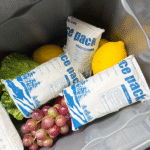Son las paquetes de hielo secos peligrosos? Ingestion and Skin Contact Risks Explained
Paquetes de hielo seco, Hecho de dióxido de carbono sólido (Co₂), are essential in industries like shipping, conservación de alimentos, y transporte sanitario. Sin embargo, their extreme cold temperature and sublimation properties make them hazardous if mishandled. This article delves into the risks of skin contact and ingestion, providing safety guidelines to minimize potential harm.

What is Dry Ice and Why is it Hazardous?
Dry ice is the solid form of CO₂, which sublimes (gira de sólido a gas) a -78.5 ° C (-109.3°F), making it far colder than regular ice. While its unique properties make it a valuable tool for cooling, it also poses significant risks when handled improperly. These include severe frostbite, internal injuries from ingestion, and suffocation from CO₂ buildup in confined spaces.
Why Is Dry Ice So Dangerous?
The extreme cold of dry ice can cause severe burns or frostbite on contact with skin. Además, as dry ice sublimates into CO₂ gas, it can displace oxygen in poorly ventilated spaces, conduciendo a la asfixia.
| Hazard Type | Nivel de riesgo | Safety Measure |
|---|---|---|
| Skin Contact | Alto | Wear thick gloves, manejar con cuidado |
| Inhalation | Alto (confined) | Asegurar una ventilación adecuada |
| Ingestión | Muy alto | Never ingest, keep away from children |
Skin Contact Risks: How Dangerous is Dry Ice for Your Skin?
Direct skin contact with dry ice is one of the most common risks associated with handling it. The extreme cold can cause frostbite, similar to a first-degree burn, and in severe cases, can lead to tissue necrosis. Immediate medical attention may be required for significant exposure.
What Happens if Dry Ice Touches Your Skin?
When dry ice makes contact with the skin, it freezes the skin cells, causing frostbite and even tissue damage. Symptoms can include redness, dolor, blisters, and in extreme cases, permanent skin damage. To avoid injuries:
-
Always wear thick gloves or protective clothing when handling dry ice.
-
If skin contact occurs, immediately immerse the affected area in warm water para 10-15 minutos.
-
Do not rub the area, as this can worsen the injury.
Ingestion Risks: What Happens If Dry Ice is Swallowed?
Ingesting dry ice is extremely dangerous and can cause severe internal injuries. Dry ice will rapidly sublimate in the stomach, Liberando el gas de co₂. This can lead to a dangerous buildup of pressure, potentially causing the stomach or intestines to rupture, which could be fatal.
Symptoms of Dry Ice Ingestion:
-
Severe internal burns: The extreme cold can freeze the tissues in the mouth, throat, and digestive system.
-
Perforation of internal organs: The sublimation process generates pressure that can cause ruptures in the gastrointestinal tract.
-
Asfixia: CO₂ buildup in the body can cause suffocation, especialmente en espacios reducidos.
How to Prevent Accidental Ingestion
-
Always keep dry ice out of reach of children and pets.
-
Never ingest dry ice or use it in beverages or food unless it is part of a professionally controlled setup.
Safe Handling and Storage Practices for Dry Ice
While dry ice can be highly beneficial, it must be handled with extreme caution. Adhere to the following safety practices to reduce risks:
Safe Handling Tips
-
Usar guantes protectores: Always use thick gloves designed for extreme temperatures.
-
Asegurar una ventilación adecuada: Store dry ice in áreas bien ventiladas to avoid CO₂ buildup.
-
Evite los contenedores herméticos: Never store dry ice in sealed containers as pressure buildup can cause explosions.
Proper Storage Techniques
-
Use insulated containers, but not airtight ones, to allow CO₂ gas to escape safely.
-
Avoid storing dry ice in confined spaces where CO₂ gas can accumulate.
First Aid Measures for Dry Ice Exposure
Skin Contact: If skin contact occurs:
-
Remove the affected area from the dry ice immediately.
-
Immerse the area in warm water para 10-15 minutos (do not rub the area).
-
Seek medical attention immediately if frostbite symptoms are severe.
Ingestión: If dry ice is ingested:
-
Do not induce vomiting.
-
Seek emergency medical help immediately.
-
Provide information about the amount and time of ingestion to medical personnel.
2025 Trends and Developments in Dry Ice Safety
The safety of dry ice handling continues to improve, with ongoing advancements in technology and regulations. En 2025, Las tendencias clave incluyen:
-
Biodegradable packaging: To reduce environmental impact while maintaining safety.
-
Improved safety protocols: Enhanced training and better handling equipment.
-
Alternativas ecológicas: Ongoing research into alternative cooling methods to reduce reliance on dry ice.
These advancements are making dry ice safer for both consumers and professionals.
Preguntas frecuentes
Is it safe to use dry ice in a closed room?
No, dry ice should never be used in a closed room without proper ventilation. CO₂ gas can displace oxygen and cause suffocation.
¿Cuánto dura el hielo seco??
Dry ice lasts for approximately 18-24 horas in an insulated container, depending on the amount and insulation used.
Can dry ice be shipped safely?
Sí, dry ice can be shipped safely in specialized containers that allow gas to escape, prevenir la acumulación de presión.
Conclusión: Safely Handling Dry Ice
Dry ice packs are invaluable tools across various industries, but their hazards must be taken seriously. By understanding the risks associated with skin contact and ingestion, and following proper handling and storage procedures, you can minimize potential harm.
Actionable Tips for Safe Handling:
-
Always wear protective gloves and use tongs when handling dry ice.
-
Store dry ice in well-ventilated areas to ensure safe sublimation of CO₂.
-
Educate others about the dangers of dry ice, particularly children and pets.
Acerca de Tempk
En Templ, we specialize in providing safe and reliable cold chain solutions, including dry ice for refrigeration. With years of industry experience, our products adhere to the highest safety standards to ensure the proper use of dry ice without risks. Contáctenos hoy for professional advice on safe dry ice usage and cold chain management.























